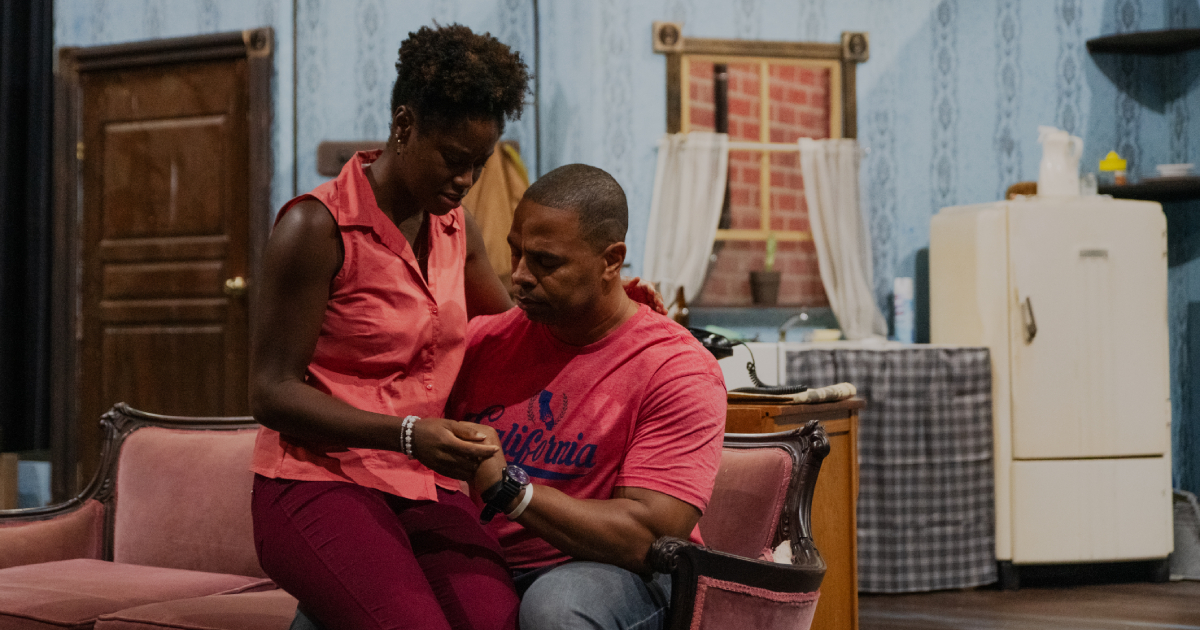Most plays never get written. Of those that make it to the page, most don’t get performed. Of those that manage to get performed, most are quickly forgotten.
Those that manage to last—through a combination of timeless relevance and inarguable artistry, surviving decades—are the best of the best. A Raisin in the Sun (now at Circle Theatre, through August 24th) is among them.
Written by Lorraine Hansberry, the first Black woman to have a play appear on Broadway, Raisin tells the story of a mid-century Chicago family getting by but not thriving. Into their midst drops a seeming blessing, a $10,000 life insurance check written to Lena, the family matriarch. There’s no surer way to expose a family’s fault lines than by introducing a lot of money; suddenly dreams that have always seemed half-mirage begin to take on solidity.
In a rare and interesting decision, there are two casts for Circle’s production: Cast 1 and Cast 2. It’s a daring choice; to work, both casts need to be equally committed and of at least close to equal talent. By making that choice, director Amisha Groce and Circle as a whole are making a declaration: we have more than enough great actors to go around.
Judging by Cast 1, the cast who performed on Friday, August 9th, that declaration’s justified. Ruth Ann Molenaar, as Lena, displayed all the dignity, tenacity, and quiet resolve of her character. Julian Newman, as her son Walter Lee, has real physical presence; at times, it seemed that his ambitions might cause him to implode.
Majesty White, as Walter’s wife, Ruth, perfectly conveyed the way wives understand their spouse’s but love them anyway. Biola Zuniga, who played Walter’s sister, Beneatha, was less convincing, at least initially. But as her character began to explore her African roots, Zuniga seemed to step out of her shell, becoming both funnier and deeper.
The story begins with young Travis (Jordan Allen), Walter’s son, reading Langston Hughes’ “Harlem.” The poem attempts to pin down what it calls “a dream deferred”:
Does it stink like rotten meat?
Or crust and sugar over—
like a syrupy sweet?
There is, as the poem’s ending reminds us, another possibility: explosion.
That threat of explosion hangs over the play, and especially over Walter. He’s landed on a plan for the money, never mind that it isn’t his—opening a liquor store alongside some other men. It would be an investment, a way to get up in the world. A way to be someone. To show his son that he’s someone. But Ruth, a godly woman, says no. You sense that she’s seen the damage liquor can do, and she wants no part of it.
What prevents the play from veering into melodrama is that it never really does explode. The play’s neither a tragedy nor a comedy; instead, it presents the kind of people who aren’t always given the spotlight: real people, people who do their best to get by. Like Shakespeare, she seems to both know her characters and forgive them. Never once does she place her thumb on the scale.
Lorraine Hansberry died at the impossibly young age of 34, a victim of pancreatic cancer. In 1964, the year before she died, she spoke to winners of a creative writing contest. She said, “Though it is a thrilling and marvelous thing to be merely young and gifted in such times, it is doubly so, doubly dynamic, to be young, gifted and black.” She never got to be old, and, sixty-five years after its debut, her masterpiece hasn’t gotten old either. No wonder Circle’s production of it is so full of life.
A Raisin in the Sun
Circle Theatre
Aug. 8-24
https://circletheatre.org/production/a-raisin-in-the-sun/





